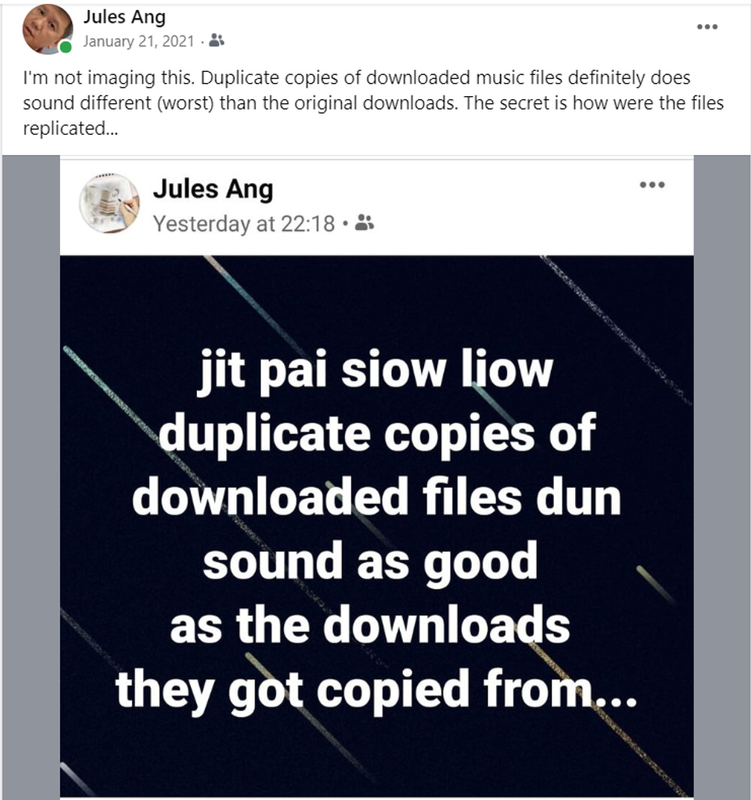Please watch Part 1 of this Video shared by Romy the Cat :
Last edited:



HelloIn my system, playback of the same recordings (Decca classical recordings from the golden age) on vinyl (a mix of original and reissue pressings cleaned on a Keith Monks RCM) versus streamed high res digital (96.0 or 176.4 kHz and 24-bit over Qobuz) sounds very, very similar.
The digital playback has a soundstage which is just as expansive (width, depth, height and scale) as the vinyl playback, is marginally superior on macro and micro dynamics (due to the lower noise floor), and has similar levels of inner detail (spatial information, harmonics, etc.). There is no surface noise at all via the digital playback, just the residual hiss of the original analogue tape.
This was not the case prior to adding the MSB Technology Reference Digital Director to my Reference DAC and it certainly was not the case with the earlier iteration of MSB Technology DACs.
Note that I use the passive (constant impedance) analogue volume control "preamp" of the MSB Technology Reference DAC for both digital and analogue source playback. My phono preamp (a Jeff Rowland Cadence with battery power supply) provides loads of super quiet gain for my 0.5 mV output MC cartridge. My speakers are actively tri-amplified (via a line level active crossover) in a dedicated, symmetrical and acoustically treated listening room. I listen in the relative near field. It's not as if some major source of distortion is masking sonic differences between the two sources with "equivalent" software.
If I was to start over again, and I did not already own a significant number of LPs which are not available via digital sources (or are inferior masterings via digital, e.g., Fleetwood Mac's Rumours album), then I would not bother with a turntable.
In terms of what my analogue and digital sources would cost to replace or replicate today, I think that I have more invested in the digital (a ratio of approximately 1.5:1.0).
Where would I go to improve my vinyl playback further? That would be an Acoustical Systems AStellar turntable. Unfortunately, I do not have the disposable income for such a step whilst paying a mortgage in Sydney.
Could I achieve the same digital results for less money? Possibly with an MSB Technology Premier DAC and Premier Digital Director/Network Renderer module. Possibly with a Playback Designs MPD-8 (or MPD-6) and partnering MPT-8 (or MPS-6). Noting that their volume controls are for the DAC output only, requiring a separate analogue preamplifier for vinyl playback at considerable expense for the requisite degree of transparency and low distortion.
It's not trueSo, I wasn't imaging things

Everytime someone copy/paste a digital file, it does change the sound!
"jit pai seow liow" => this time I must be going crazy
Maybe i wasn't so crazy after all.
.
So, I wasn't imaging things

Everytime someone copy/paste a digital file, it does change the sound!
"jit pai seow liow" => this time I must be going crazy
Maybe i wasn't so crazy after all.
.
copy and paste is different than a conversion......which is either dac/adc or to another sampling rate. or some digital tool applied. file transfer is like copy and paste. when Grundmann refers to each digital step he is referring to some degree of manipulation. which is not to say that every copy and paste is harmless or cannot change things. but not certainly to the degree manipulation clearly does. if i move files from my NAS to my server, that is not changing things. but it could slightly. but more likely not.No, it does not. Copying and pasting a digital file results in an identical copy.
if i move files from my NAS to my server, that is not changing things. but it could slightly. but more likely not.
Grundman is speaking to how digital files are changed in 'form' from the native files to the end product. or how a digital step in making a record has a cost. there is no free step. musical essence is diminished each time clearly. in the analog recording/mastering process musical essence is retained much more. but it's not perfectly clean either. the difference is the type and degree of change. vinyl is different than the tape source, but not necessarily worse musically.
No, not slightly and no, not more likely than not. This is pure make believe. If your computer says the file was copied, the file was copied. Nothing missing. You could do it a thousand times and it will still be identical.
Musical essence as in something that is retained in analog processing and not in digital processing is an incredibly vague concept, to the point that I don't know how to discuss that.
I think to me the best way is listening to audio equipments in blind tests and i have my personal blind test method .
In my blind test (between A and B) i close my eyes and ask my friend to play different music albums when A is in the system . I repeat again and again and my brain try to learn about the sound of A.
Then I ask my friend to put B in the system and play the music and my brain try to learn the sound of B. This test maybe takes more than 30 minutes and in the next step i ask my friend to choose A or B and with blind eyes i try to detect It is A or B.
If my answer be wrong then i do not continue test and i convince that i can not detect the difference but if i detect correctly for more than 5 times then i can say the test is valid and i can hear the difference between A and B.
Brain needs the time to learn in my blind test.
files are more than bits, there is also timing issues, data transfer issues. why does network gear matter? why do different types of data storage matter? why does a physical media sound different than files? they should not. but they do. in my Wadax server what speed you write to the SSD drives matters in the performance. there are 4 different slots with different write speeds. crazy stuff.
these timing issues are almost never relevant to how business, industry, or science uses data. but music playback is affected to some degree. with music, bits being just bits is not the whole picture.
anyway; these small issues pale compared to how music recording data gets manipulated in the mixing and mastering processes. or how an analog recording suffers from an adc/dac process. that was my only point.
File copy (the topic of my post) is not what you mention by playback (reading a file to memory, producing a bitstream, transporting and clocking said bitstream and converting that to analog signal). One is a purely digital, bit perfect, closed loop, easily verifiable and correctable operation, the other is a series of transformations with so many degrees of freedom a series of books is required to expose the main caveats with them.actual file playback performance is more than bits, there is also timing issues, types of cable issues, data transfer issues, noise issues. why does network gear matter? why do different types of data storage matter? why do clocks matter?...alot!!!! why does a physical media sound different than files? they should not. but they do. in my Wadax server what speed you write to the SSD drives matters in the performance. there are 4 different slots with different write speeds. crazy stuff.
these timing issues are almost never relevant to how business, industry, or science uses data. but music playback is affected to some degree. with music, bits being just bits is not the whole picture.
anyway; these small issues pale compared to how music recording data gets manipulated in the mixing and mastering processes. or how an analog recording suffers from an adc/dac process. that was my only point. but to say bits is bits is all there is, is also not quite right.
Here is a fun and interesting video on the topic:
But really, I default to what I said earlier. Digital vs vinyl sources are very similar. Easy to be fooled on what you are listening too.
| Steve Williams Site Founder | Site Owner | Administrator | Ron Resnick Site Co-Owner | Administrator | Julian (The Fixer) Website Build | Marketing Managersing |










